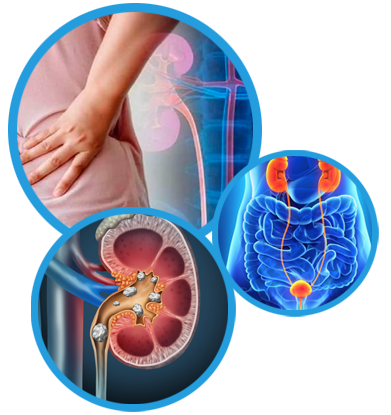
Urinary Incontinence
Urinary incontinence is a common condition characterized by the involuntary loss of urine, leading to leakage from the bladder.
It can significantly impact quality of life and may affect individuals of all ages, although it is more prevalent among older adults.
Urinary incontinence can vary in severity, from occasional leakage to complete loss of bladder control.
It can significantly impact quality of life and may affect individuals of all ages, although it is more prevalent among older adults.
Urinary incontinence can vary in severity, from occasional leakage to complete loss of bladder control.
2. Symptoms
Symptoms of urinary incontinence may include:
- Leakage of urine during coughing, sneezing, or physical activity (stress incontinence)
- Sudden, intense urge to urinate followed by leakage (urge incontinence)
- Frequent urination (overactive bladder)
- Difficulty emptying the bladder completely (overflow incontinence)
- Nocturnal enuresis (bedwetting)
- Continuous leakage of urine (total incontinence)
3. Causes
Urinary incontinence can have various underlying causes, which may include:
– Weak pelvic floor muscles, often due to childbirth, aging, or surgery
– Damage to nerves controlling bladder function, such as spinal cord injury or neurological disorders
– Overactive bladder muscles causing involuntary contractions (detrusor instability)
– Hormonal changes, particularly in women during menopause
– Certain medical conditions such as urinary tract infections, diabetes, or prostate enlargement
– Medications that increase urine production or relax bladder muscles
– Lifestyle factors such as obesity, smoking, or excessive caffeine consumption
– Damage to nerves controlling bladder function, such as spinal cord injury or neurological disorders
– Overactive bladder muscles causing involuntary contractions (detrusor instability)
– Hormonal changes, particularly in women during menopause
– Certain medical conditions such as urinary tract infections, diabetes, or prostate enlargement
– Medications that increase urine production or relax bladder muscles
– Lifestyle factors such as obesity, smoking, or excessive caffeine consumption
4. Diagnosis
– Diagnosis of urinary incontinence typically involves a thorough medical history, physical examination, and diagnostic tests.
– Additional assessments may include urinalysis to check for urinary tract infections, bladder diary to track voiding patterns, and urodynamic testing to evaluate bladder function and urine flow.
– Imaging tests such as ultrasound or cystoscopy may be performed to assess the structure and function of the urinary tract, particularly if underlying causes such as bladder stones or tumors are suspected.
– Additional assessments may include urinalysis to check for urinary tract infections, bladder diary to track voiding patterns, and urodynamic testing to evaluate bladder function and urine flow.
– Imaging tests such as ultrasound or cystoscopy may be performed to assess the structure and function of the urinary tract, particularly if underlying causes such as bladder stones or tumors are suspected.
5. Conclusion
– Urinary incontinence is a common and often treatable condition that can significantly impact quality of life.
– Treatment options for urinary incontinence may include lifestyle modifications, pelvic floor exercises (Kegels), bladder training techniques, medications, medical devices such as pessaries or urethral inserts, and in some cases, surgery.
– Seeking evaluation and treatment from a healthcare provider is important for accurate diagnosis and management of urinary incontinence.
– Support from healthcare providers, family, and friends can play a crucial role in managing urinary incontinence and improving overall quality of life.
– Treatment options for urinary incontinence may include lifestyle modifications, pelvic floor exercises (Kegels), bladder training techniques, medications, medical devices such as pessaries or urethral inserts, and in some cases, surgery.
– Seeking evaluation and treatment from a healthcare provider is important for accurate diagnosis and management of urinary incontinence.
– Support from healthcare providers, family, and friends can play a crucial role in managing urinary incontinence and improving overall quality of life.
Satisfied Patients
0
K+
Surgeries Performed
0
+
Years of Experience
0
+
Current News & Event
Free Health camp
Lions Club Bhagalpur Gold invites you to a free health camp in which the focus will be on urological problems.
This camp will take place this Sunday, April 14, 2024 from 9 am to 1 pm.
This camp will take place this Sunday, April 14, 2024 from 9 am to 1 pm.

KIDNEY STONE, URINARY BLADDER STONE, URINARY TRACT INFECTION, LOW TESTOSTERONE, PROSTATE CANCER, KIDNEY CANCER, RENAL CYST.
KIDNEY STONE, URINARY BLADDER STONE, URINARY TRACT INFECTION, LOW TESTOSTERONE, PROSTATE CANCER, KIDNEY CANCER, RENAL CYST.





